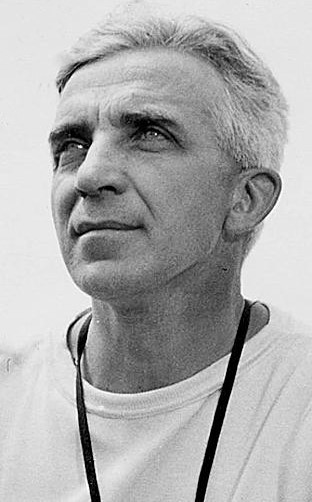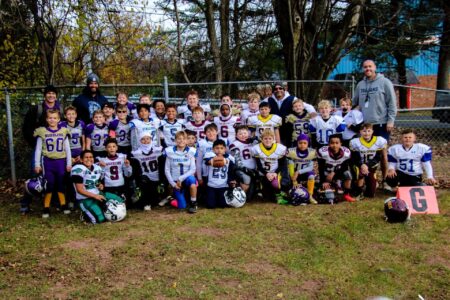The seeds of Rip Engle’s legendary coaching career first sprouted in Waynesboro. After his local arrival as an enthusiastic young teacher, Engle started his football journey, building character and teamwork using his budding leadership skills. His early Waynesboro High School success eventually grew into a prestigious head coaching position at Penn State University.
Charles “Rip” Engle was born on March 26, 1906, in rural Somerset County, Pa. Young Engle earned his nickname after he tore his trousers four times in one week while playing roughhouse schoolyard games. An athletic life seemed predestined.
From an early age, Engle’s Father taught him the values of hard work. Rip worked in a coal mine at age 14 and later became the mine’s supervisor at 19. But Engle yearned to expand his knowledge and go further in life. He enrolled at Blue Ridge College in New Windsor, Md., and played on its football team. One autumn 1927 afternoon, they played Temple University and lost 111-0.
Engle transferred to Westminster’s Western Maryland College (now McDaniel College) and enjoyed a dramatic gridiron turnaround. The school’s 1929 football team also played the Temple Owls and beat the Philadelphia squad 23-0. The “Green Terror” squad completed that season undefeated and ranked second in the nation. That reversal of fortune made a lasting impression on Engle. He excelled at collegiate football, baseball, basketball and tennis and was named all-around best athlete.
Rip Engle also concentrated on his studies and earned a college degree. While in Westminster, he met two pivotal people who shaped his future. The first person was Coach Dick Harlow, who taught Engle lessons in football strategy and leadership. Harlow was a 1912 Penn State grad and former Nittany Lion head coach. His collegiate pedigree would prove prophetic for Engle’s later coaching career.
A second influential person was lovely Mary “Sunny” Broughton. She became the love of Engle’s life and his devoted wife during a 52-year marriage.
After college graduation, Engle’s inherent good nature and leadership potential earned attention from Waynesboro’s civic leaders. The high school invited Rip to teach mathematics and coach the football and basketball teams. As the Depression era began, Engle went to work in 1930.
He established local friendships and quickly earned respect. Many high-schoolers called Engle “Father” since he took a personal interest in their studies and families. Engle also kept a vigilant watch on his player’s conduct and daily habits. On the playing field, the coach was serious and intense, but away from the sidelines, players appreciated Engle’s courteous, thoughtful and soft-spoken personality.
Engle’s Father had instilled high standards. In his youth, Rip’s Dad offered $100 to any of his six children who promised to avoid cigarettes or alcohol until age 21. “That was a lot of money to a country boy,” Engle recalled. He not only completed that youthful pledge but never smoked or drank during adulthood.
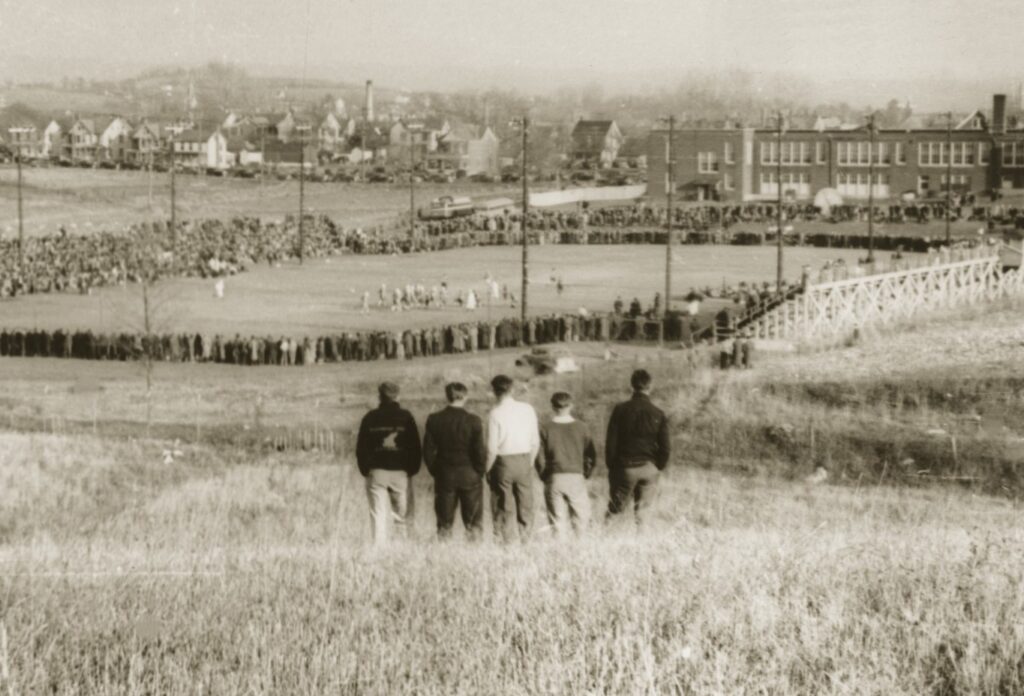
Waynesboro’s team was called the Blue and Gold Tornado back then, and Engle turned the squad into a local powerhouse. The team’s coming out year was 1933. After that 10-0 perfect season, the Tornadoes spun into a dominant era, winning area championships in eight of 11 years. To fit into Engle’s offensive and defensive schemes, his footballers were “small, fast and deceptive.”
Each year during the 1930s Engle’s Waynesboro teams accomplished amazing feats. In 1935, they beat rival Gettysburg for the first time since 1921. The 1937 Tornadoes were undefeated and thrashed Cumberland 67-0. The following year the only loss was a 2-0 heartbreaker to the Hagerstown Hubs in a game playing during a blinding snowstorm.
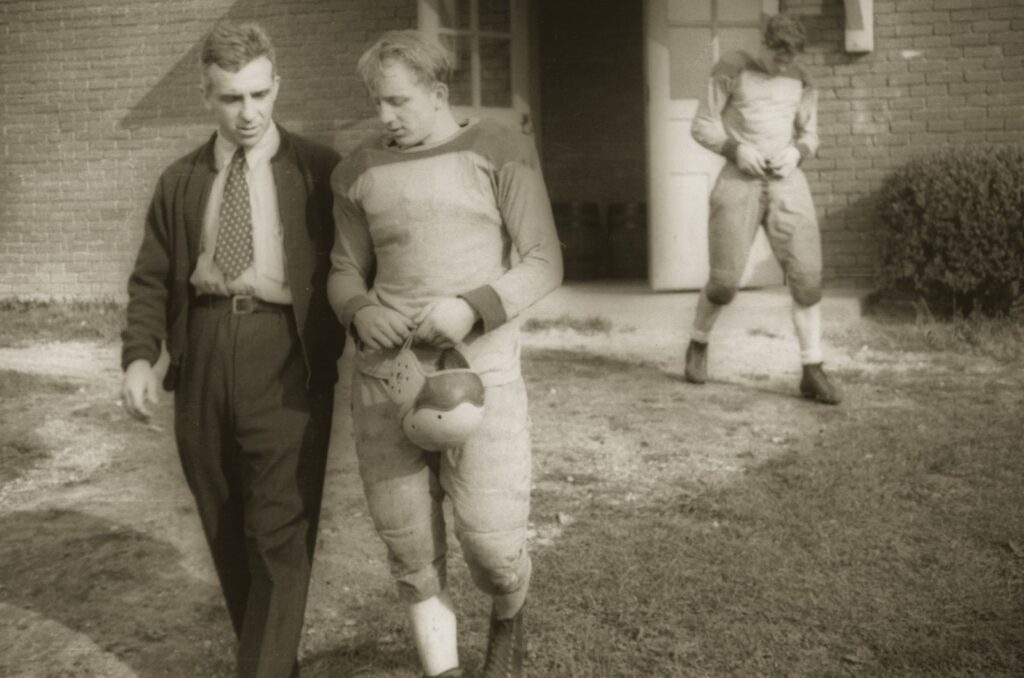
Engle’s 1939 team was probably his finest Waynesboro squad. The team gave up only one score all season, a touchdown to Gettysburg. No other team penetrated Waynesboro’s 15-yard-line. On Thanksgiving Day, 6,000 Waynesboro fans watched their team beat Hagerstown 8-0. That overwhelming ’39 defensive showing hasn’t been matched since.
Engle taught his players this mantra: Keep your temper, have faith in your teammates, keep a stout heart in defeat, keep your pride in check after a win, keep fit, honor the rules and play the game gracefully. As his time in Waynesboro ended, Engle’s football record was 76-20-7.
As the country plunged into World War II, Engle’s career gained new direction when he was recruited into college sports. After leaving Waynesboro, his first stop was a return to Western Maryland College. Then, he moved to Providence, R.I., to coach at Brown University, a prestigious Ivy League school. During the war, Engle helped plug staff vacancies by coaching golf and track, adding to his assistant football duties. In 1944, Engle became Brown’s head football coach.
Engle turned Brown’s football program around. After five years at the helm, Engle concluded his tenure at Brown with two fantastic seasons in 1948-49. His teams won 15 games and lost only 3. Then a new leadership opportunity came calling.
Meanwhile, Engle maintained contact with his ex-players in Waynesboro. Many had returned home from overseas WWII service. A group of former Tornado star players wanted to incorporate a local semi-professional football team. Could Rip offer advice?
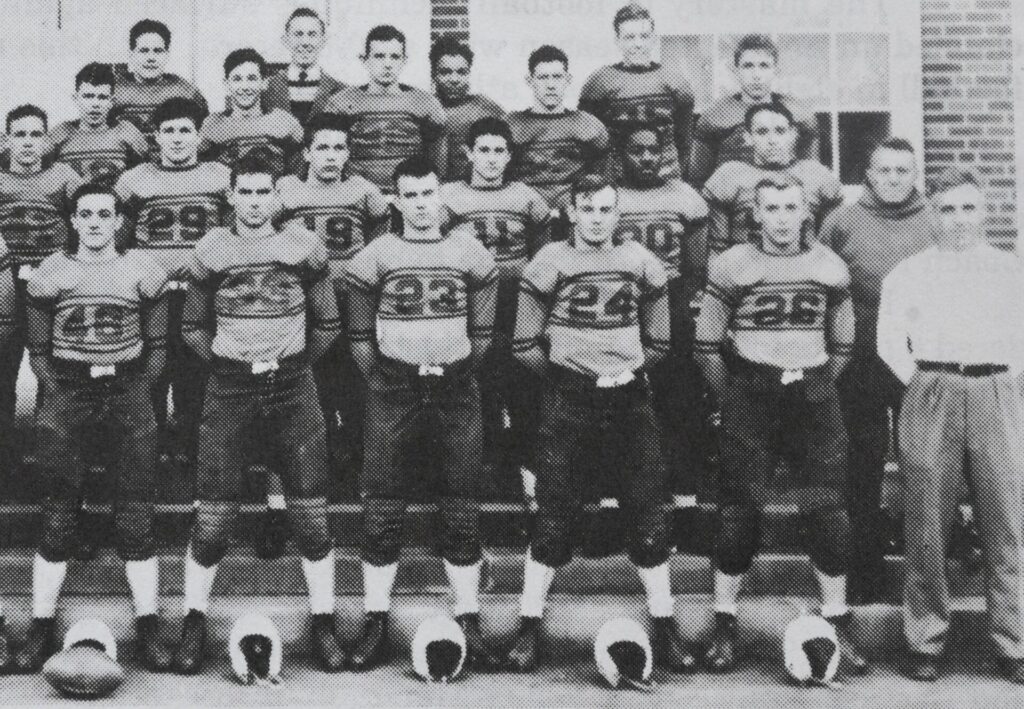
Engle corresponded from Rhode Island and sent creative plays from his “Wing-T” offense. With Engle’s help, the newly named Waynesboro team, called the Tigers, dominated in their early years. During one stretch, they won 27 straight games and crushed local opponents, rekindling the glory years of Waynesboro’s 1930s high school teams.
In 1950, a surprise phone call launched Engle’s football career into the stratosphere. Penn State’s head coach position was vacant, and the university asked Engle to interview. Although PSU’s football program was respected, it wasn’t yet a national dynamo. Engle landed the job and realized the tremendous opportunity it offered. He immediately devoted tireless energy into the new job, traveling 30,000 miles a year while recruiting new players. No one would outwork Rip Engle.
No coach would out-worry Engle either. Famous for having high expectations for lowly opponents, one sportswriter joked Engle would probably lose sleep over a rival football team that fielded ballerinas. For Engle, no contingency was left unchecked, no detail was ignored– he prepared thoroughly for each game. Penn State players responded. Engle never endured a losing season, and year-by-year he built a sturdy foundation for PSU football, helping create the respected national program known today.
Engle’s finest Penn State game played out in 1964. That year, his unranked 3-4 team faced unbeaten and number 3 ranked Ohio State. Although they narrowly beat OSU the previous year, few expected the Nittany Lions to win or even contend. The Buckeye’s Coach was Woody Hayes, a fiery field general. Most thought Hayes’ team would punish PSU for last year’s loss. The game finished differently, as Penn State dominated OSU and won 27-0. The Buckeyes didn’t record a first down until the fourth quarter.
Hayes said that loss was the worst trouncing he had ever experienced. From that day forward, no team took Penn State football for granted. Even the modest Engle said about that victory: “No football team ever played a perfect game, but at Ohio State, our team came as close as I ever saw.”
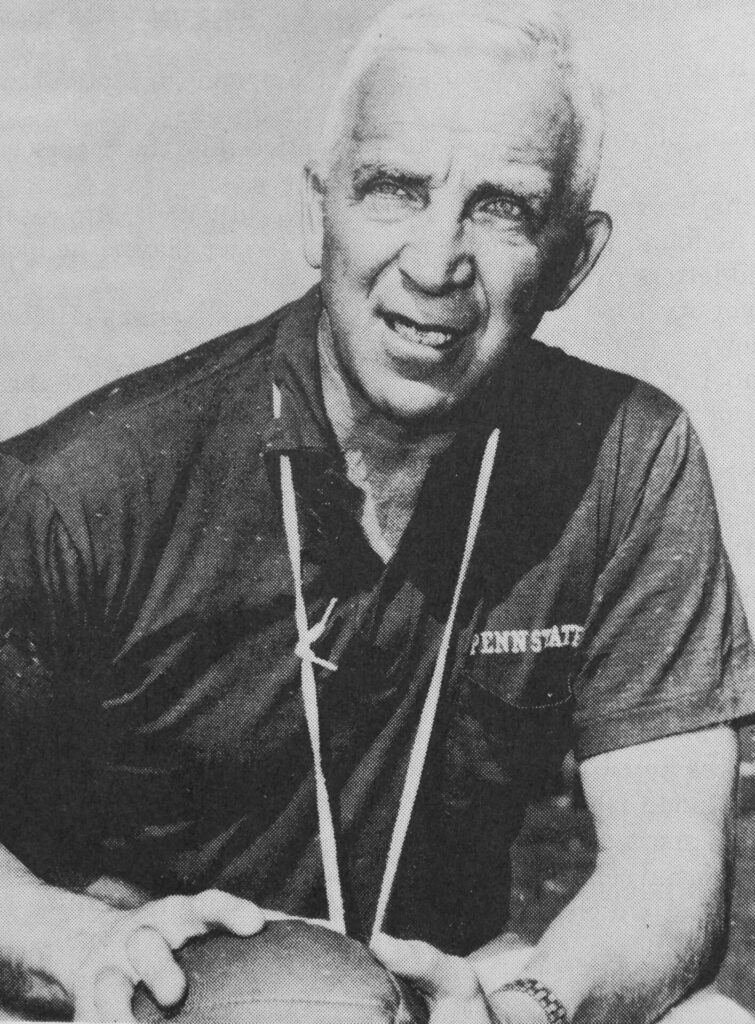
As Penn State’s national reputation grew, the man with the close-cropped silver hair, weathered complexion and penetrating blue eyes steered the Lions to greater successes. Prominent years included 1959 and 1962, both seasons concluded with 9-2 records. Engle led his team to four bowl game appearances, winning three over respected teams — Alabama, Georgia Tech and Oregon. Penn State wouldn’t suffer a losing regular season until 1988.
During his 16-season reign in Happy Valley, Rip Engle’s legend grew. PSU fans, university staff and alumni, and his college coaching peers all respected him. Most agreed Engle had few flaws as a man or a coach. Rip once joked his only vice was his blue Cadillac, which had a ship’s compass mounted on the dash. Always a planner, Engle said, “I like to know where I’m going.” Engle achieved an impressive 104-48-4 won-loss tally at Penn State and a 132-68-8 combined career coaching record.
Engle never stopped mentoring and teaching. During off-seasons, he coached clinics in Europe, Japan and the Far East. While at Penn State, he also groomed a successor. Engle had persuaded a Brown University ex-quarterback to put off a law degree and join him as an assistant coach at PSU. When Engle approached age 60 in 1965, he decided to retire. By then, the coach Engle brought to State College was fully prepared to take the reins. That man was Joe Paterno.
After retirement, Engle stayed in contact with his Waynesboro roots. He often wrote letters or made phone calls to ex-players and old friends. In 1980, he came to town to commemorate the 50th anniversary of his first 1930 Tornado team. Engle was the guest of honor at a Sept. 6th dinner that year.
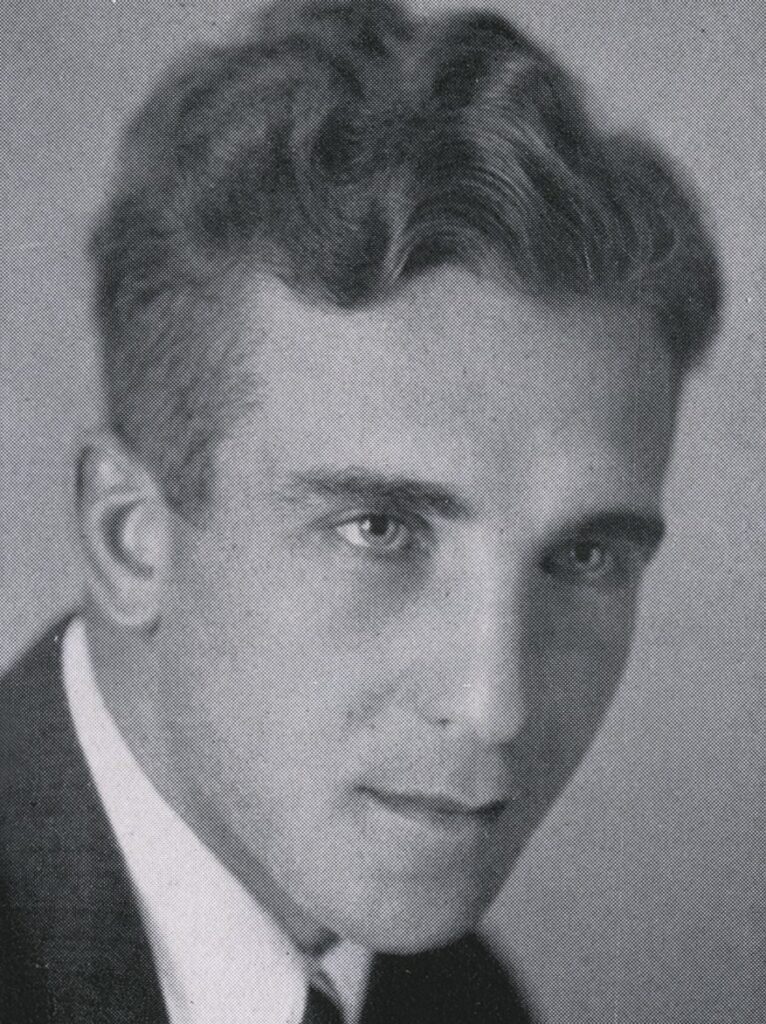
Charles Rip Engle died on March 7, 1983. Universal praise for his outstanding leadership and impeccable character marked his passing. Joe Paterno said, “He was a true gentleman and a wonderful human being.” Former Waynesboro 1939 player Joe Kugler said, “I really feel as if I lost a father.” Eighty-four years after Engle left the local sidelines, he still has the most wins for a Waynesboro football coach.
Many in Waynesboro recalled Engle never forgot the town that christened his career. After establishing his reputation for hard work and decency, and instilling those same character traits to shape boys into men, Waynesboro never forget Rip Engle either. More than 40 years after his death, Engle’s legacy is also celebrated at Brown and Penn State. The College Football Hall of Fame honored Rip Engle, inducting him in 1973.
Combining his lifelong philosophies for clean living, fair play and hard work, Engle once defined the sport he loved. “I believe the game of life and the game of football have much in common, especially if you are going to play them to win.”



